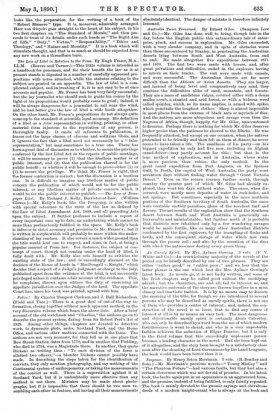The Law of Libel in Relation to the Press. By
Hugh Fraser, M.A., LL.M. (Reeves and Turner.)—This little volume is intended as a handbook for pressmen, and for their benefit the law as it at present stands is digested in a number of carefully expressed pro- positions with notes attached, while the statutes relating to the subject are printed in an appendix. The law of libel is a com- plicated subject, and in treating of it, it is not easy to be at once accurate and popular. Mr. Fraser has been very fairly successful ; but the lay journalist who should seek to guide his course by the light of his propositions would probably come to grief ; indeed, it will be always dangerous for a journalist to sail near the wind, and he had better give the law of libel a wide berth altogether. On the other hand, Mr. Fraser's propositions do not always quite come up to the standard of scientific legal accuracy. His definition of a libel as a false representation in writing, printing, or other material form injurious to the reputation of any person, is thoroughly faulty. It omits all reference to publication, it leaves out the large classes of obscene and seditious libels, and it ignores the fact that a libel need not necessarily be a " false representation," but may sometimes be a true one. There has been a great deal of discussion as to whether, to secure the privilege conferred by the last Libel Act on the reports of public meetings, it will be necessary to prove (1) that the libellous matter is of public interest, and (2) that the publication thereof is for the public benefit; or whether it will be enough to prove either (1) or (2) to secure the privilege. We think Mr. Fraser is right, that the former contention is correct ; but the discussion is a bootless one. It is difficult to imagine any libellous matter of public concern the publication of which would not be for the public interest, or any libellous matter of private concern which it would be for the public interest to publish. —The Law of News- paper Libel. By Richard J. Kelly, Barrister-at-Law. (William Clowes.)—Mr. Kelly's book, like the foregoing, is also written with special reference to the state of the law as defined by the Law of Libel Amendment Act, 1888, and all preceding Acts upon the subject. It further professes to include a report of every important case up to date, an undertaking which cannot be more than perfunctorily fulfilled in the space. Mr. Kelly's book is inferior in strict accuracy and precision to Mr. Fraser's ; but it is written in a style which will probably be more within the under- standing of lay readers. It also covers a much wider ground than the title would lead one to suspect, and aims, in fact, at being a popular manual of Press law. For instance, the subject of con- tempt of court, though not coming under the head of libel, is fully dealt with. Mr. Kelly also sets himself to criticise the existing state of the law; and is exceedingly alarmed at the decision of the House of Lords in " MacDougall v. Knight," which decides that a report of a Judge's judgment or charge to the jury, published apart from the evidence at the trial, is not necessarily privileged unless it contains a fair account of the evidence. This, he complains, throws upon editors the duty of exercising an appellate jurisdiction over the Judges of the land. The appellate Court has, since his book was printed, agreed with him.






































 Previous page
Previous page